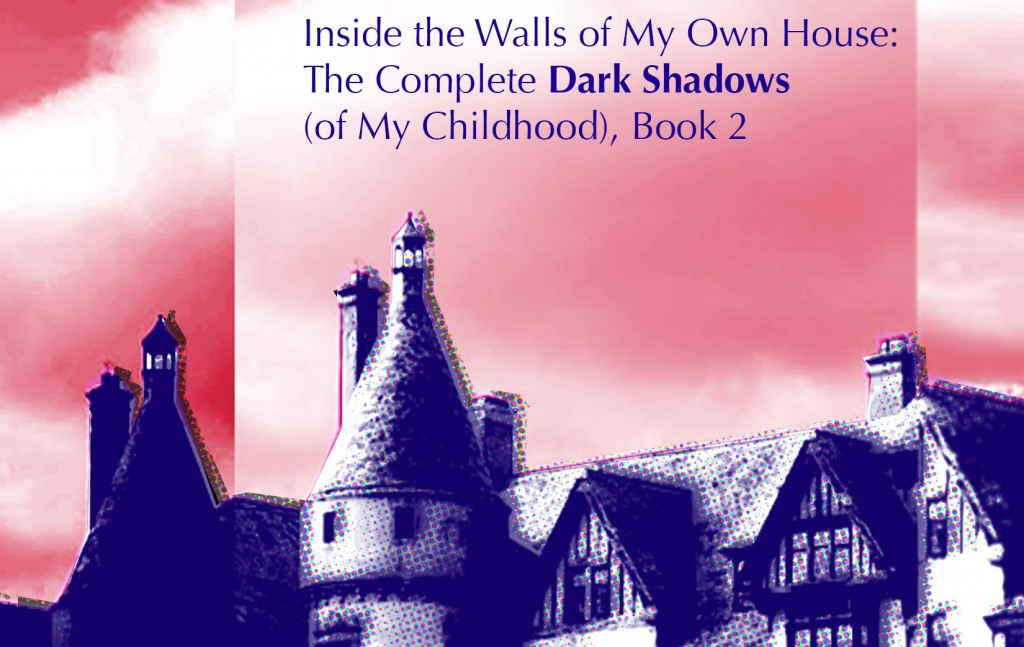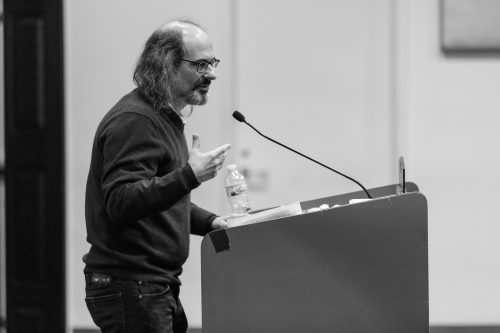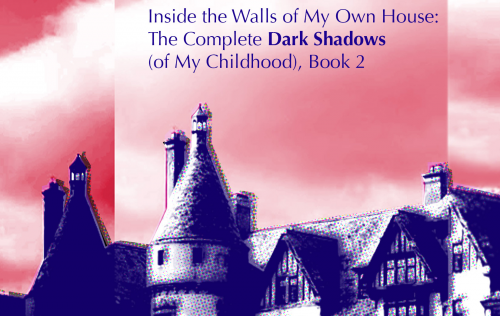
Poetry Faculty Interview: Tony Trigilio

To give prospective and current students some insight into the Poetry MFA program, I’ll be talking with members of the faculty. Kicking things off is Tony Trigilio, Interim Chair for the Department of Creative Writing. His latest collection is Inside the Walls of My Own House: The Complete Dark Shadows (of My Childhood), Book 2.
How did you discover poetry?
My earliest experiences with poetry came through music, as a child listening to my older brother’s and sister’s records. “The Fool on the Hill” and “Eleanor Rigby” made me cry as a six-year-old, which I guess means I was hooked on the power and musicality of lyric emotion at a very young age. As a child, I also was drawn to the poetry of religious texts—especially the repetitious lyricism of hymns—and Dr. Seuss. I was lucky that my fourth-grade Creative Writing teacher, Ms. Omark, was a hippie who gave us wildly imaginative writing prompts (and brought in her painter-boyfriend to teach us pointillism). She was one of those rare adults who asked me about my creative projects and actually wanted to hear my answers. One of my earliest poems was a long, anxiety-riddled description of my fear of tornadoes. Ms. Omark asked me to rewrite it on poster board and she taped it to the front of her desk—my first publication!
What brought you to Columbia and what do you think sets us apart?
I had moved from Boston to Chicago to teach at a small college in the suburbs—a long commute from Chicago’s Wicker Park neighborhood, where I lived. During that first year in Chicago, I saw a job notice for the position at Columbia, and I really wanted to be a part of the kind of experimental energy Columbia was known for. And I think this is definitely what sets us apart: our relentless experimenting, as artists and as faculty and students, and the environment we create for both faculty and students to be eclectic in their art practice. At many schools, faculty are tied to their specialties; but at Columbia, we’re encouraged also to experiment beyond our specialties and into other art forms. I’m a poet and editor who also writes creative nonfiction and literary scholarship, and I’m also a serious musician. Part of what sets us apart, I think, is that many faculty and students are immersed in more than one art form and are obsessed with making sure that their art practice never becomes complacent. We’re always trying to surprise ourselves—in our writing, but also in our classes.
What is your favorite part about living and working in Chicago?
I love that Chicago poets are supportive and collaborative. Here at Columbia, we try to create this same kind of community in our Creative Writing programs.
What are you reading right now?
I’m always reading many different kinds of books at once. As for poets, I’m reading Cheena Marie Lo’s A Series of Un/Natural/Disasters (Commune Editions), Tyehimba Jess’s Olio (Wave), and Columbia Poetry faculty member David Trinidad’s collaboration with Jeffery Conway and Gillian McCain, Descent of the Dolls: Part I (BlazeVOX). I’m also re-reading Charles North’s What It Is Like: New and Selected Poems (Turtle Point). As for other books, I just started R. Sikoryak’s Terms and Conditions (Drawn and Quarterly), which appropriates Apple’s Terms and Conditions statement into a graphic novel (it’s the kind of book that the phrase “tour de force” was invented to describe), and Leslie Kean’s Surviving Death: A Journalist Investigates Evidence for an Afterlife (Crown/Penguin), a rigorously researched examination of consciousness and the death process.
Are there writers or collections you find yourself regularly returning to? What brings you back to them?
I frequently return to George Oppen (his New Collected Poems, edited by Michael Davidson) as a touchstone for why poetry is necessary. I always learn from his precise eye and his relentless effort to see the world more clearly in every new poem. His “Of Being Numerous” is one of the most important poems in my life.
What advice do you have for young poets?
Read more than you think you need to read—then read even more. Read widely: opening yourself to other literary genres (and to non-literary work) can help you grow as an artist and as a person. Be persistent—and even stubborn—about the need for art-making in a culture that does not value art as much as it should. And remember that poems endure and po-biz does not.
Would you share one of your poems with us?
It was originally published in the Academy of American Poets, Poem-A-Day Project.
Housesitting, Boston,
[this is an indent] our first day,
a deer loitered outside the kitchen
window, chewing a clump of shrubs
in the parking lot between
their house and the commuter
rail tracks to the suburbs.
Furry ears, peach fuzz around
the antler tips, soft, dreary eyes—
afraid if I moved, I’d break the spell
of our ridiculous L.L. Bean tableau.
His legs tensed, ready to flee if I reached
for the dish soap or squeezed
the sponge too hard. We stared,
sized each other up: you are Nature—
either boring, like a robin posing
on the front lawn, or terrifying
(killer bees, tornadoes, the mysterious
cicada drone in my ears that began in this
moment, staring each other down).
I hate the grass and mosquitos—
in the Midwest, it’s never polite
to tell the truth, but I’m back East
now, where niceties waste everyone’s
time. We’d just flown in and had lunch.
Liz took a photo. I eventually looked
away and finished the dishes.

